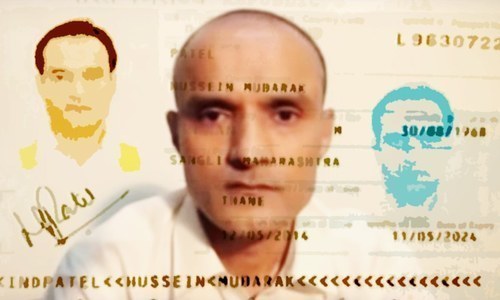ISLAMABAD: As the International Court of Justice (ICJ) formally commences public hearing on the conviction of Indian spy commander Kulbhushan Jadhav from Feb 18, Pakistan’s delegation for oral arguments will depart for The Hague on Friday (today).
Attorney General Anwar Mansoor would lead the Pakistani delegation whereas Director General South Asia Dr Mohammad Faisal would lead the Foreign Office side, a senior official told Dawn.
Explore: Who is Kulbhushan Jadhav?
The world court has set a timetable for public hearings from Feb 18 to 21 in The Hague and Harish Salve, who represents New Delhi, is expected to argue first on Feb 18. Then English Queen’s Counsel Khawar Qureshi will make submissions on Feb 19 from Islamabad’s side.
Pakistani delegation to leave for The Hague today
Then India will reply on Feb 20 while Islamabad will make its closing submissions on Feb 21. It is expected that the ICJ decision may be delivered by the summer of 2019.
“We are fully prepared with our strongest evidence being the valid Indian passport recovered from Commander Jadhav with a Muslim name,” said the official, adding that Pakistan was committed to implementing the decision, irrespective of what decision came from the ICJ.
Commander Jadhav was captured in Balochistan in March 2016 and later confessed to his association with Indian intelligence agency Research and Analysis Wing (RAW) and his involvement in espionage and fomenting terrorism in Pakistan.
On May 18 last year, the ICJ through an interim order stayed Jadhav’s execution after which the Foreign Office communicated to the world court that the government of Pakistan had instructed relevant departments to give effect to the ICJ order.
Pakistan has already furnished two counter-memorials on the Indian claims, which brought the case before the world court under the Vienna Convention on Consular Relations 1963.
India filed its reply on April 17, 2018, to which Pakistan filed a detailed rejoinder on 17 July that year.
Take a look: The spy who fell from the sky
In reply to a question about Iran, the official said the government was convinced that Iran had no role in Jadhav’s episode though he remained there for some time. “India wants to drag Iran into this dispute but we will not let it happen,” he said.
New Delhi claimed that Jadhav was an innocent businessman who was kidnapped from Iran and tortured to confess to being a RAW agent, but the official believes that Indians had failed to prove the allegation despite repeated requests for evidence that Jadhav was kidnapped.
Likewise, Indians also failed to satisfy that Jadhav had retired from the Indian Navy and New Delhi also failed to explain when and why he was retired since he was only 47 years old when arrested.
Also read: Furore in India as news website calls Jadhav RAW spy
Similarly India needs to explain how Jadhav was in possession of an authentic Indian passport issued under a false “cover” Muslim name — Hussain Mubarak Patel — which he had used at least 17 times to enter/exit India.
India had been asked this question many times, even by highly respected Indian senior journalists such as Praveen Swami and Karan Thapar, but Indians declared this as irrelevant or mischievous propaganda.
Eventually India argued that the passport was clearly a forgery, but refused to explain why a highly credible independent UK expert was wrong when he said it was an authentic Indian passport issued by the Indian authorities.
New Delhi demands that the ICJ order Pakistan to return Jadhav to India, but the international court had repeatedly explained that it was not a criminal court of appeal. The world court has also clarified in its earlier decisions that even if consular access was denied, the proper recourse would be an effective review to be reconsidered by the local courts.
Jadhav and his family, the official said, could invoke Article 199 of Pakistan’s constitution by seeking the relief through the country’s high court, but India launched proceedings in the ICJ, 14 months after Jadhav was arrested and a month after he was convicted, to seek a stay order without a hearing.
“Why is India asking for an order for the return of Jadhav in the face of the ICJ’s decision and the independent expert evidence confirming Pakistan has effective review and reconsideration before the high court and the Supreme Court,” the official asked.
India has also failed to explain why May 21, 2008 Agreement on Consular Access between India and Pakistan, which was drafted by India and provides Article VI for either state to be entitled to consider a request for consular access about persons implicated in national security matters, does not apply in this case.
India has also failed to explain why highly respected UK-based military law experts are wrong when they say that Pakistan’s high court and Supreme Court provide an effective review and reconsideration of the military court process.
In its detailed counter-memorial to the Indian claims, Pakistan has raised a number of questions like the existence of the customary international law about an “espionage exception” to consular access in view of obvious dangers of allowing a state-sponsored spy/terrorist untrammelled communication with the authorities of his sending state that despatched him to commit unlawful acts.
The counter-memorial by Pakistan has also drawn attention to a bilateral agreement on consular access between India and Pakistan that clearly qualifies consular access in matters of national security.
Significantly, Pakistan has asked the ICJ to consider whether India has acted illegally in facilitating Jadhav’s espionage/terrorism by providing him with the passport.
On previous occasions when the ICJ has considered the issue of death penalty/consular access, the ICJ has never ordered relief of “acquittal, release and return” such as that sought by India.
Published in Dawn, February 15th, 2019















































